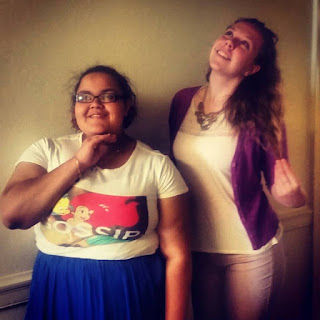Residence Life: Experiential Learning
By: James LaDow
Regardless of the reasons
for wanting to become a Resident Assistant at Frostburg State University, many
have tried to become one. They have gone through the interview process. They
have gone through training. For some it will become a thankless waste of time
and just something they will end up loathing for the rest of their time in
college. For others it will change who they are and make them realize what they
really want to do for the rest of their lives. Whether one has a good experience
or a bad experience is up to anyone that the RA will have to come across during
the job. Co-workers, bosses, and residents alike can all aid (or destroy) the
entire ride.
 |
| Donovan Meadows, ex-RA of Diehl and Gray halls. |
For ex-RA Donovon
Meadows, it felt like a dredge through the mud for the better part of a
semester. His experience started like any other RA’s but ended with him
quitting in anger at the rampant communication issues that seemed to plague
Residence Life.
Meadows worked in Diehl
and Gray Hall for one year and stated that his new job was “okay, but by the end
of the first semester, some members of the professional staff really showed
their true colors.” When asked to clarify, Meadows went on to say that they
seemed to have changed their original outlook on what they need out of their
staff. From their academics coming first and their job second, to being more
“[…] you’re an RA first, second, and third, and maybe a person with other needs
to take care of.”
He believes that the RAs
here don’t get the appropriate amount of rest and never have a day off which
can result in what he referred to as “RA Burnout.” He says he was often told
that he could have weekends off, “but you should use them to plan programs or
bulletin boards.”
He adds that the
professional staff at the residence life office (RLO) would continue to stack
more and more responsibilities onto the student staff with what Meadows
considered an unfair compensation. “At the beginning of the year it was one job
and by the end of the year it’d be a completely different job,” Meadows commented.
Meadows went on to say
that there were multiple instances of miscommunication where the professional
staff would tell the RA’s a week later if there were changes that had been made
to policy. Sometimes he would have to find out from other RAs, not from RLO or
any professional staff member.
It was a lose-lose
situation for Meadows because “if you weren’t strict enough then you got
blowback from the higher-ups and if you were doing your job your residents
would hate you.” He felt unfulfilled and vilified, so he quit the RA life and
moved off campus the very next semester.
 |
| Alexa Bashaw (right) with a resident. |
In contrast, the two year
veteran RA Alexa Bashaw has had a quite the positive stay in the position at
FSU. She has now dealt with situations that she had never before had run into
and learned how to deal with all of them. The job itself had given her a
platform to be a leader to her fellow students as well as being a teacher to
them.
She believes that one of
the more challenging aspects of the job is that “sometimes when you have made a
bond with a student and they do something they shouldn’t, then you have to go
and confront them and it could become awkward.” To make the most positive
experience, Bashaw has tried her best to create a teacher-student bond with her
residents so that “when you do have to talk to them about an issue, they may not
hate you forever afterwards.”
Bashaw has worked in
Cumberland and Frost halls, both of which are for freshmen. One of the more
rewarding parts of the job for her is when the new students come in and “[…]
they’re nervous and don’t have a lot of friends and don’t know who they are and
by the end of the semester they’re totally different.” Seeing the students rise
to the challenge of the higher education really puts everything in perspective
for this RA.
The balance between RA
and friend is something that has been a challenging aspect of the job for
Bashaw similar to Meadows’s experience. She believes that “you should always
try and do your job but try and not have your residents to think that you are
out to get them.”
Both Meadows and Bashaw
would have some changes to the RA contract they would like to see happen after
their stay here at FSU. For Meadows, it is a change in how respectful the
professional staff is towards the RAs; he is looking for the staff to continue
to treat them like students and not just say that they will. “Be willing to
compromise on things with us.” He would also like to see a more thorough description
of the job laid out in the contract as to be more realistically prepared for
the position.
Bashaw, on the other hand,
would like if the paperwork would go more digital to not go through as much
paper as they usually do in a year. She would also like a more detailed
description of the policies and procedures in RLO so there is not so much
confusion surrounding “what you think is a problem versus what’s not or what
RLO says is a problem.”
Though the resident assistant
position can be an incredibly challenging job, Meadows and Bashaw handled their
time well. Their experiences prove that RAs, while doing the exact same job,
can have very different expectations and experiences, positive or negative.
No comments:
Post a Comment